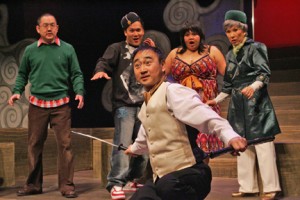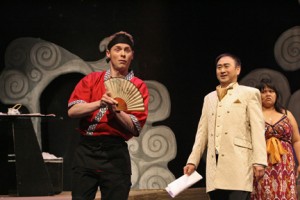RECOMMENDED
Following his death in a car crash, third-generation Japanese-American Raymond Kobayashi finds himself at heaven’s Reincarnation Station where he is given special permission to begin a new life immediately—on one condition. He must go back as a Japanese-American. Though the word Ixnay is never uttered in Paul Kikuchi’s new comedy-fantasy, a resounding “No way!” is Raymond’s response to this proposition. He’s had enough of his just-ended life as a sansei and the thought of being Japanese-American a second time is one he wants to put an emphatic “nix” on.
Just why Raymond would rather go back as anyone but a J-A, and just how the other Asian-Americans waiting at the Reincarnation Station react to his refusal is the topic of Kikuchi’s World Premiere comedy. Though the play itself is more like something you might see at a community theater than a new work produced at the nation’s premier Asian-American theater, the sparkling performances of its cast, a number of very funny one-liners, and some spot-on observations of the differences among various Asian-American communities make Ixnay more entertaining than not.
Raymond (Aaron Takahashi) is joined at the Reincarnation Station by “Mr. Ozaki Sir” (Gedde Watanabe), the man in charge; Reiko Tanaka (Elizabeth Ho), Ozaki’s cute Japanese-American assistant; Dr. Frank Fong (Matthew Yang King), a nerdy Chinese-American dentist; Julie Fotoni (Ellen D. Williams), a hefty Samoan-American; Grace Kim (June Kyoko Lu), a feisty Korean-American grandma; Eric Galindo (Dante Bosco), a hip-hoppy Filipino-American; and Norton Biggs (Matt Braaten), a white Asian wannabe.
Though Caucasian-Americans often tend to bunch all Asians into one ethnicity, it becomes clear almost immediately that Asian-Americans see each other in a very different way. Take for example Reiko, who is interested in Dr. Frank—until she learns that he’s Chinese. As Eric explains, there is a totem pole, a pecking order, that places Japanese in the most prestigious position, followed by Chinese (who’ve got their own pecking order), then Koreans. Julie is relieved to learn that Samoans are not the lowest on the totem pole. It’s the Hmongs (a Southeast Asian ethnic minority, and the frequent butt of Ixnay jokes.)
At first Raymond is “just trying to comprehend the fact that I’m dead,” so he doesn’t immediately understand Mr. Ozaki’s special offer, akin to “getting a Fast Pass at Disneyland.” His fellow Reincarnation Station-ites are jealous; they’ve each had to put in two, four, even five years waiting for their chance to be sent back to a new life on earth. When queried, all of them want to be reincarnated the same ethnicity as before, all except Raymond, who’d rather not “move on” at all than be J-A again. Unfortunately, if Raymond doesn’t go, no one else will either because, like a domino, if he doesn’t fall, neither will the others.
Ozaki explains why it’s so urgent that Raymond fulfill his destiny as a born-again Japanese-American. According to Ozaki, the Japanese race is dying out because so many J-As are in “hip” mixed marriages. The men want Caucasian wives because they have “bigger tatas” and the women want their children to have Caucasian DNA, kind of like a Rodeo Drive accessory. In fact, continues Ozaki, it’s not just the Japanese-Americans who are marrying outside their race, it’s all Asian ethnicities—except the Hmong, of course, once again the butt of an Ixnay joke. (Perhaps Hmong aren’t theatergoers.)
Statistics are quoted (J-As in mixed marriages are 2.5 times more likely to get a divorce). More jokes are told, with Norton aka “Confused Anglo Man” the butt of many of them. In a running gag that works, Grandma Grace keeps slapping Raymond. In another less successful one, every time Michael Jackson’s name is mentioned, Eric the Filipino hipster goes into a dance.
Under Jeff Liu’s direction, performances in Ixnay are very good indeed, moving beyond the racial stereotypes in Kikuchi’s script. Takahashi is such a great “everyman” as Raymond that one longs to see him play more three-dimensional roles. Watanabe is never anything less than hilarious, as he has been since his breakthrough role in Sixteen Candles. Ho is cute, and scores laughs as “Miss 4th Runner-Up Nisei Week.” King, so memorable in a dramatic role in EWP’s Yankee Dawg You Die, proves himself an adept comedian here. Lu milks her stereotypical elderly Korean woman role for every laugh possible, Basco is a charismatic stage presence as Galindo, and so is Williams in the role of Jule. Braaten is not only very cute and funny as Norton but, because of his two-year stay in Japan, has the role of the Japanese-speaking Asian wannabe down pat.
If only the cast had a script at the level of their talents. To be fair, Ixnay does seem a particularly Asian type of humor, or at least reminded me of some Japanese TV comedies I’ve seen. Still, as the country’s most important Asian-American theater, East West players could be giving their audiences the level of accomplished playwriting they got last season in Durango, in Dawn’s Light, and in the somewhat less successful but still very good Voices From Okinawa.
For Ixnay, master scenic designer Kurt Boetcher has designed a fanciful set quite different from his usual work. Christopher M. Singleton’s lighting is first rate, as is Dennis Yen’s sound design. Ivy Y. Chou’s costumes tell us a lot about the characters simply by what they are wearing.
As an ESL teacher with decades of teaching Asian students, I liked the way Ixnay spotlighted the uniqueness of the diverse Asian ethnicities that make up our city, and also the special position occupied by U.S.-born Japanese-Americans. As a longtime fan of several of the cast members and as someone discovering a number of talents new to me, I was impressed by the cast’s performances and comedic gifts, and I laughed out loud at the jokes and gags more often than not. Though Ixnay could be a lot better than it is, audience members should find themselves mostly entertained and amused by Raymond Kobayashi’s visit to the Reincarnation Station.
East West Players, David Henry Hwang Theatre, 120 Judge John Aiso St., Los Angeles.
www.eastwestplayers.org
–Steven Stanley
February 18, 2009
Photos: Michael Lamont




 Since 2007, Steven Stanley's StageSceneLA.com has spotlighted the best in Southern California theater via reviews, interviews, and its annual StageSceneLA Scenies.
Since 2007, Steven Stanley's StageSceneLA.com has spotlighted the best in Southern California theater via reviews, interviews, and its annual StageSceneLA Scenies.







 COPYRIGHT 2024 STEVEN STANLEY :: DESIGN BY
COPYRIGHT 2024 STEVEN STANLEY :: DESIGN BY